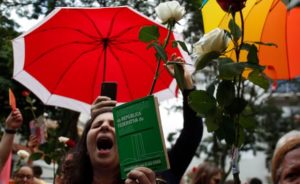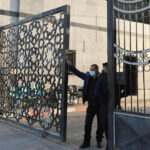The election of Jair Bolsonaro is a threat to the country’s culture, but writers and artists are determined to fight guns with books
I come from two generations of political exiles. My grandparents left Romania when antisemitism threatened to destroy everything they had: it would soon destroy their parents and siblings. From these grandparents, I inherited my Jewish surname; from their destination, Argentina, my first name. My parents, in turn, left Argentina when the state terror became too grim; friends and colleagues were slaughtered. From my parents, who went to Brazil, I inherited a certain nonconformism; from their destination, Portuguese, the language in which I write. It never occurred to me that my fate might one day come to resemble theirs, that dark forces might make me leave my country. Today, for the first time in 36 years, I wonder whether this fear is as absurd as all that.
All of a sudden – though nothing really happens suddenly when you’re talking about history – I can see a dystopia taking shape in my country. Brazil has elected a president who defends torture and killings. However dystopian it may seem, there is nothing futuristic about this narrative. The journey Jair Bolsonaro is planning has as its destination a past that we have never overcome, dark decades that have never left us.
This past-laden future is made up of countless threats: the persecution of political adversaries, the wiping out of activism, the criminalising of social movements as terrorist organisations. It is made up of authoritarian gestures: a vice-president who normalises autocoups – where leaders assume extraordinary powers; an elected deputy, Bolsonaro’s son, who says that a soldier and a corporal are all it would take to shut down the supreme court. The situation is so extreme that we’re witnessing a bizarre phenomenon: millions of committed voters rooting for their elected candidate never to fulfil his promises.

This future is also made up of present oppressions. People afraid of wearing red T-shirts, alert to some possible reaction from the president’s yellows. Gay and trans people who disguise their gestures of affection, or themselves, so that nobody recognises their disobedient bodies. Militants, journalists, teachers under threat. Like my parents in another time, I’m appalled to hear of many friends who can’t sleep, who cry when they read the news, who are already contemplating distant horizons. In these past weeks, however, many of us have understood that there’s only one possible antidote to dystopia: the reviving of some utopia.
After years of relative lethargy, resistance groups are coming together. Manifestos are being signed, campaigns organised, support networks established. Together, we’ve begun to understand that it won’t be us who are hit hardest, that the horror will be felt much more vividly in the poor neighbourhoods. This does not reassure us, and it does not make us stop: at its heart, this is a movement of solidarity and empathy.
Unlike Bolsonaro and his most radical followers, we aren’t interested in guns. Resistance will be peaceful or nothing, democratic or nothing. In the struggle against guns, a new symbol has arisen: books. Thousands went to the ballot boxes carrying books by a wide range of writers: George Orwell, Virginia Woolf, Clarice Lispector. Counter to the fundamental texts Bolsonaro exalts – the Bible and the autobiography of a torturer – what his critics value is the plurality of perspectives.
Culture is one of the things Bolsonaro’s dystopia may well seek to destroy, eliminating the ministry of culture, cutting off funding, doing away with work that upsets the values of some notional Brazilian family. But culture doesn’t simply disappear if a government attacks it. Rather, it turns incisive and urgent. We Brazilian writers, united and alert, have talked about the need for an art that is harrowing, that doesn’t ignore the brutality of our times, that makes itself an intervention into the present. We have also talked about the necessity for all art, in any form. Beautiful art, too, and lyrical, poetic, against the flagrant ugliness of what faces us. These will be years for writing like never before, for producing books, plays, films, having parties, having sex, having children. Years for living.
My own ancestors’ example might lead me to fear the worst, for myself and for the country that welcomed my parents and lent me its joy. But I prefer to live in the light of my ancestors, not in their shadow, and as far as possible to join those around me, fusing my own destiny with theirs.





